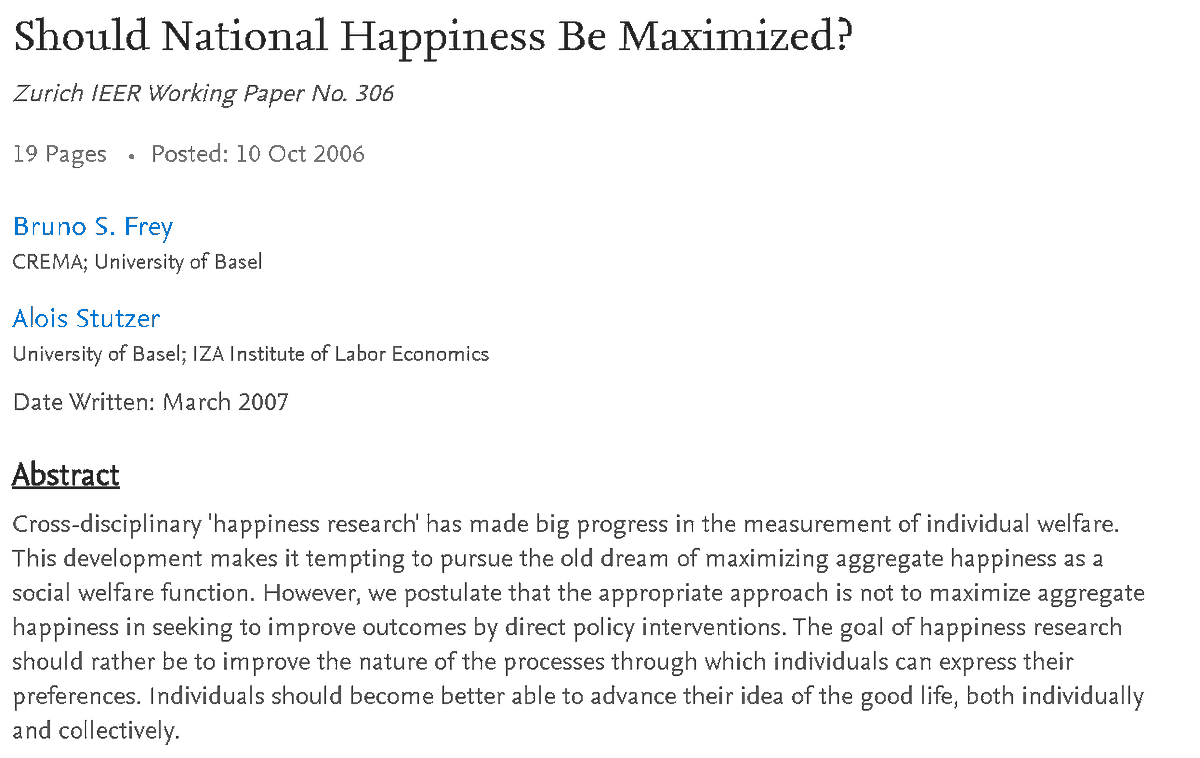Many people discuss using alternative welfare measures, prominently @beyond_ideology.
This article by @BrunoSFrey discusses why happiness is a useful indicator (Bruno pioneered that research), but should be used to improve processes, not as an outcome.
https://papers.ssrn.com/sol3/papers.cfm?abstract_id=936289
This article by @BrunoSFrey discusses why happiness is a useful indicator (Bruno pioneered that research), but should be used to improve processes, not as an outcome.
https://papers.ssrn.com/sol3/papers.cfm?abstract_id=936289
You will read many things about happiness if you follow Twitter or other sources. Some are misleading. E.g. that beyond a certain income more money does not make you happier. This can be true, but is not obvious from the actual empirical analysis. Let me shortly explain.
First, newer analyses show that there are diminishing absolute returns (i.e. the same absolute increase in income gives you less additional happiness the richer you become), but still a net positive effect on happiness.
If you look at the data yourself (easily done, download the World Value Surveys, which has an income and a happiness question), you can see that the relationship is almost perfectly log-linear.
That means, a 1% increase in income provides a nearly constant increase in happiness.
That means, a 1% increase in income provides a nearly constant increase in happiness.
Second point, we easily forget that all our regressions estimate average effects, i.e. the effect for a hypothetical average individual.
However, in reality we differ. People who strive for high incomes are fundamentally different than those who value other aspects like leisure.
However, in reality we differ. People who strive for high incomes are fundamentally different than those who value other aspects like leisure.
There are persons for whom more money will likely bring more happiness (because they can buy things they want, prestige,...). For others, money matters less. The statistical average bunches both groups together. Worst case this average effect is misleading for both groups.
Example:
Group 1: More money constantly brings more happiness
Group 2: More money means more work, so at some point even correlates negatively with happiness.
Average effect: Zero returns to income beyond a certain level.
Group 1: More money constantly brings more happiness
Group 2: More money means more work, so at some point even correlates negatively with happiness.
Average effect: Zero returns to income beyond a certain level.
This thinking is not strictly a mistake, it is just what a standard regression estimates. But when thinking about welfare it is crucial to treat people as individuals, not a monolithic group. One key feature of a free, liberal society is that everyone can pursue "their" happiness
Conclusion: Do not make or trust any statement that says: "People" do not need X or Y, which was shown in this regression analysis (or simply assumed). For welfare, not a hypothetical average citizen matters, but what individuals want. And that differs a lot.
I am a big fan of emphasizing that GDP is not welfare, and using additional indicators. My point is that to be meaningful those should account for individual preferences. This means on what individuals really want, and not on what "experts" think people "should" want.
Any opinions @beyond_ideology?
(btw. I really liked your debate with @GFelbermayr) !
Or others: @BachmannRudi @ArashMV @SDullien @FazitBlog @D_Langenmayr @schnellenbachj @MFratzscher @FuestClemens ?
(btw. I really liked your debate with @GFelbermayr) !
Or others: @BachmannRudi @ArashMV @SDullien @FazitBlog @D_Langenmayr @schnellenbachj @MFratzscher @FuestClemens ?

 Read on Twitter
Read on Twitter


